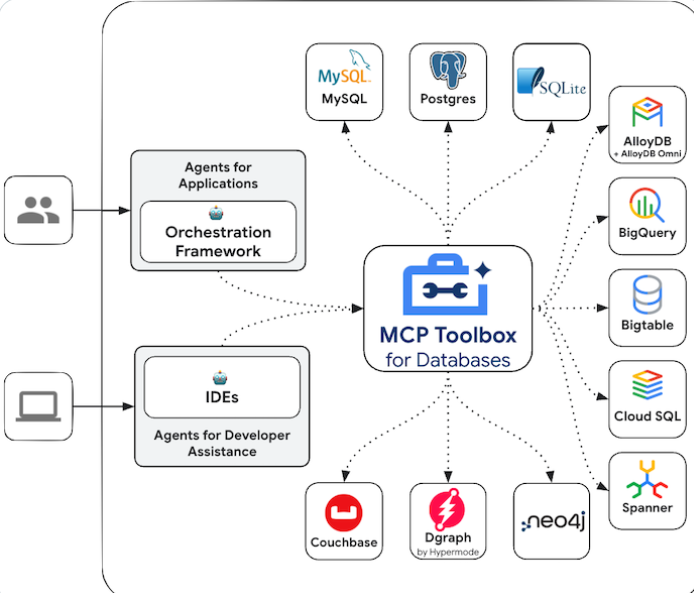Today, as AI technology develops rapidly, how to enable AI agents to interact efficiently and securely with databases has become a focus for developers. In July 2025, Google officially released the MCP Toolbox for Databases, an open-source tool module designed to simplify the integration of AI agents with SQL databases through the Model Context Protocol (MCP).

Image source note: The image is AI-generated
Simple Integration, Connect to the Database in 10 Lines of Code
The MCP Toolbox for Databases is the latest open-source module of Google's GenAI Toolbox, specifically designed for interactions between AI agents and databases. Traditionally, building integrations between AI and databases required handling complex authentication, connection management, and security control issues. With the MCP Toolbox, this can be achieved in less than 10 lines of Python code. Developers only need simple configuration to allow AI agents to efficiently access databases, significantly lowering the development barrier. Moreover, the tool supports reusing tools across multiple AI agents, greatly improving development efficiency and enabling rapid iteration and large-scale applications.

Project address: https://github.com/googleapis/genai-toolbox
Integrated Security and Efficiency Mechanisms
The MCP Toolbox for Databases addresses common security and performance issues when AI agents directly access databases through built-in connection pool management and authentication mechanisms:
- Connection Pool Management: Optimizes the lifecycle management of database connections, avoiding performance bottlenecks caused by frequent connections in traditional methods.
- Authentication Mechanism: Supports secure measures such as IAM authentication and GCP Secret Manager, ensuring that sensitive credentials are not exposed and reducing security risks.
- Schema Introspection: The tool can automatically parse the database schema, providing structured context information for AI agents, thus generating safe and accurate query statements, reducing query errors and "hallucination" phenomena.
These features make the MCP Toolbox a reliable choice for production environments, especially suitable for scenarios requiring rapid development of database-related AI tools.
Wide Application Scenarios, Empowering Developers
The MCP Toolbox for Databases supports various databases, including Google Cloud's AlloyDB, Spanner, Cloud SQL, and BigQuery, covering diverse needs from hybrid transactional and analytical processing (HTAP) to global-scale applications. Developers can use this tool to build AI-driven solutions ranging from real-time analysis to complex business applications. For example, through the MCP Toolbox, AI agents can query public datasets like Google Cloud release notes using natural language and quickly extract key information.
Additionally, the MCP Toolbox supports integrating HTTP endpoints as MCP-compatible tools, further expanding its application range. For instance, developers can integrate external services like weather APIs into the MCP workflow with simple configurations, providing AI agents with richer functional support.
Open Source Ecosystem, Supporting Global Developers
As a fully open-source tool, the MCP Toolbox for Databases is publicly available on GitHub, allowing developers to freely access source code, container images, or build it directly. Google also provides detailed installation guides and example code, such as tutorials on configuring BigQuery data sources through the `tools.yaml` file, helping developers get started quickly. AIbase noted that when used in conjunction with the Google Agent Development Kit (ADK), the tool can further simplify the development and deployment process of AI agents.
However, the industry has pointed out that the current MCP Toolbox mainly supports databases within the Google Cloud ecosystem. In the future, it may need to expand compatibility with other databases, such as PostgreSQL and MySQL, to meet broader developer needs. Additionally, some users have reported longer response times when executing simple commands (such as listing database tables), and Google may need to further optimize user experience.
The Future Potential of the MCP Toolbox
